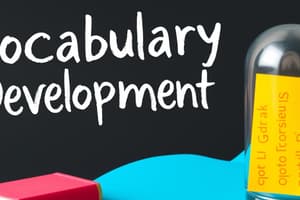Podcast
Questions and Answers
What is the primary purpose of developing a strong vocabulary?
What is the primary purpose of developing a strong vocabulary?
- To impress others with complex words
- To shorten communication
- To facilitate effective communication (correct)
- To memorize definitions of words
Which strategy involves learning vocabulary through the context of reading or speaking?
Which strategy involves learning vocabulary through the context of reading or speaking?
- Quizzes and Tests
- Word Mapping
- Flashcards
- Contextual Learning (correct)
What stage of vocabulary development comes after initial exposure but before reinforcement?
What stage of vocabulary development comes after initial exposure but before reinforcement?
- Assessment
- Recognition (correct)
- Mastery
- Reinforcement
Which resource is considered essential for finding synonyms and understanding words?
Which resource is considered essential for finding synonyms and understanding words?
Which of the following challenges affects vocabulary development the most?
Which of the following challenges affects vocabulary development the most?
What practice can help with the retention of newly learned vocabulary?
What practice can help with the retention of newly learned vocabulary?
Which vocabulary type consists of words we understand when reading or listening, but may not use in our speech?
Which vocabulary type consists of words we understand when reading or listening, but may not use in our speech?
How can personal connection assist in vocabulary learning?
How can personal connection assist in vocabulary learning?
Study Notes
Vocabulary Development in English
-
Importance of Vocabulary
- Facilitates effective communication
- Enhances reading comprehension
- Expands knowledge and comprehension in various subjects
-
Types of Vocabulary
- Receptive Vocabulary: Words understood when reading or listening
- Expressive Vocabulary: Words used in speaking and writing
-
Strategies for Vocabulary Development
- Contextual Learning: Learn words through context in reading or conversation
- Word Mapping: Break down words into definitions, synonyms, antonyms, and usage
- Flashcards: Use for memorization and testing understanding of new words
- Word Games: Engage with vocabulary through games like Scrabble or crossword puzzles
- Reading Widely: Exposure to diverse literature increases word exposure
-
Stages of Vocabulary Development
- Initial Exposure: Encountering new words in context
- Recognition: Understanding the meaning of words used in context
- Reinforcement: Using new words in personal writing and speech
- Mastery: Regular and confident use of vocabulary in various forms
-
Resources for Vocabulary Building
- Dictionaries and Thesauruses: Essential tools for understanding and finding synonyms
- Vocabulary Apps: Tools like Anki or Quizlet for interactive learning
- Literature and Poetry: Exposure to advanced vocabulary through analysis of texts
-
Assessing Vocabulary Knowledge
- Quizzes and Tests: Formal assessments to gauge vocabulary knowledge
- Self-assessment: Reviewing one's ability to use new vocabulary in writing and speech
-
Challenges in Vocabulary Development
- Limited Exposure: Poor vocabulary growth in non-stimulating environments
- Language Variability: Understanding regional dialects and variations in vocabulary usage
- Retention: Difficulty in remembering newly learned words without practice
-
Tips for Effective Vocabulary Learning
- Regular Practice: Frequent exposure and use of new words
- Personal Connection: Relate new vocabulary to personal experiences or interests
- Engagement with Media: Listening to podcasts, watching films, and engaging with various forms of media
By focusing on these areas, learners can enhance their vocabulary and improve their overall proficiency in English.
Importance of Vocabulary
- Improves communication skills
- Enables deeper reading comprehension
- Expands knowledge in various subjects
Types of Vocabulary
- Receptive Vocabulary: Words understood when reading or listening
- Expressive Vocabulary: Words used in speaking and writing
Strategies for Vocabulary Development
- Contextual Learning: Learning words through their use in reading or conversation
- Word Mapping: Analyzing words by their definition, synonyms, antonyms, and example usage
- Flashcards: Memorizing words and testing understanding using flashcards
- Word Games: Engaging with vocabulary through games like Scrabble or crossword puzzles
- Reading Widely: Expanding vocabulary through diverse literature
Stages of Vocabulary Development
- Initial Exposure: Encountering new words for the first time
- Recognition: Comprehending the meaning of new words in context
- Reinforcement: Applying new words in writing and speech
- Mastery: Regular and confident use of vocabulary in various contexts
Resources for Vocabulary Building
- Dictionaries and Thesauruses: Tools for definition and synonym exploration
- Vocabulary Apps: Platforms like Anki or Quizlet for interactive learning
- Literature and Poetry: Expanding vocabulary through advanced texts
Assessing Vocabulary Knowledge
- Quizzes and Tests: Formal evaluations of vocabulary understanding
- Self-assessment: Reflecting on the ability to use new vocabulary in writing and speech
Challenges in Vocabulary Development
- Limited Exposure: Insufficient vocabulary growth in environments lacking stimulation
- Language Variability: Understanding regional dialects and variations in vocabulary usage
- Retention: Difficulty remembering newly learned words without practice
Tips for Effective Vocabulary Learning
- Regular Practice: Frequent exposure and use of new words
- Personal Connection: Relating new vocabulary to personal experiences and interests
- Engagement with Media: Utilizing podcasts, films, and various forms of media for exposure
Studying That Suits You
Use AI to generate personalized quizzes and flashcards to suit your learning preferences.
Description
This quiz explores the importance and types of vocabulary in English, as well as effective strategies for vocabulary development. It covers receptive and expressive vocabulary, techniques such as contextual learning and word mapping, and emphasizes reading widely to enhance word exposure.




